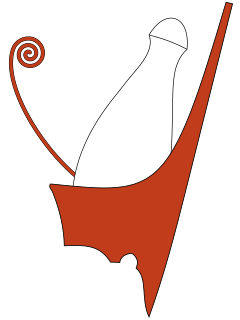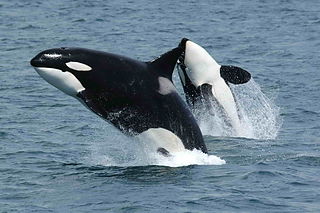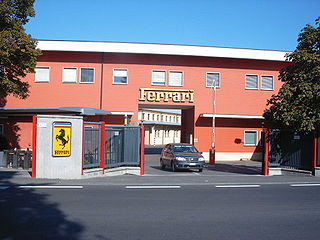The Domain Name System (DNS) is a hierarchical and decentralized naming system for computers, services, or other resources connected to the Internet or a private network. It associates various information with domain names assigned to each of the participating entities. Most prominently, it translates more readily memorized domain names to the numerical IP addresses needed for locating and identifying computer services and devices with the underlying network protocols. By providing a worldwide, distributed directory service, the Domain Name System has been an essential component of the functionality of the Internet since 1985.

Pharaoh is the common title of the monarchs of ancient Egypt from the First Dynasty until the annexation of Egypt by the Roman Empire in 30 BCE, although the actual term "Pharaoh" was not used contemporaneously for a ruler until Merneptah, c. 1200 BCE. In the early dynasty, ancient Egyptian kings used to have up to three titles, the Horus, the Sedge and Bee (nswt-bjtj) name, and the Two Ladies (nbtj) name. The Golden Horus and nomen and prenomen titles were later added.
Rabbinic Judaism considers seven names of God in Judaism so holy that, once written, they should not be erased: YHWH, El ("God"), Eloah ("God"), Elohim ("Gods"), Shaddai (“Almighty"), Ehyeh, and Tzevaot. Other names are considered mere epithets or titles reflecting different aspects of God, but Khumra sometimes dictates special care such as the writing of "G-d" instead of "God" in English or saying Ṭēt-Vav instead of Yōd-Hē for the number fifteen in Hebrew.
A genus is a taxonomic rank used in the biological classification of living and fossil organisms, as well as viruses, in biology. In the hierarchy of biological classification, genus comes above species and below family. In binomial nomenclature, the genus name forms the first part of the binomial species name for each species within the genus.

Binomial nomenclature, also called binominal nomenclature or binary nomenclature, is a formal system of naming species of living things by giving each a name composed of two parts, both of which use Latin grammatical forms, although they can be based on words from other languages. Such a name is called a binomial name, a binomen, binominal name or a scientific name; more informally it is also called a Latin name.

A domain name is an identification string that defines a realm of administrative autonomy, authority or control within the Internet. Domain names are used in various networking contexts and for application-specific naming and addressing purposes. In general, a domain name identifies a network domain, or it represents an Internet Protocol (IP) resource, such as a personal computer used to access the Internet, a server computer hosting a web site, or the web site itself or any other service communicated via the Internet. In 2017, 330.6 million domain names had been registered.
A pseudonym or alias is a name that a person or group assumes for a particular purpose, which can differ from their first or true name (orthonym). This differs from a new name that entirely replaces an individual's own. The pseudonym identifies a holder, that is, one or more persons who have but do not disclose their true names. Most pseudonym holders use pseudonyms because they wish to remain anonymous, but anonymity is difficult to achieve and often fraught with legal issues. True anonymity requires unlinkability, such that an attacker's examination of the pseudonym holder's message provides no new information about the holder's true name.
A surname, family name, or last name is the portion of a personal name that indicates a person's family. Depending on the culture, all members of a family unit may have identical surnames or there may be variations based on the cultural rules.
ISO 3166-1 is part of the ISO 3166 standard published by the International Organization for Standardization (ISO), and defines codes for the names of countries, dependent territories, and special areas of geographical interest. The official name of the standard is Codes for the representation of names of countries and their subdivisions – Part 1: Country codes. It defines three sets of country codes:

A given name is the part of a personal name that identifies a person, potentially with a middle name as well, and differentiates that person from the other members of a group who have a common surname. The term given name refers to a name bestowed at or close to the time of birth, usually by the parents of the newborn. A Christian name is the first name which is given at baptism, in Christian custom.

A digital object identifier (DOI) is a persistent identifier or handle used to identify objects uniquely, standardized by the International Organization for Standardization (ISO). An implementation of the Handle System, DOIs are in wide use mainly to identify academic, professional, and government information, such as journal articles, research reports, data sets, and official publications. However, they also have been used to identify other types of information resources, such as commercial videos.

The Irish are a nation and ethnic group native to the island of Ireland, who share a common Irish ancestry, identity and culture. Ireland has been inhabited for about 12,500 years according to archaeological studies. For most of Ireland's recorded history, the Irish have been primarily a Gaelic people. From the 9th century, small numbers of Vikings settled in Ireland, becoming the Norse-Gaels. Anglo-Normans conquered parts of Ireland in the 12th century, while England's 16th/17th-century (re)conquest and colonisation of Ireland brought many English and Lowland Scots people to parts of the island, especially the north. Today, Ireland is made up of the Republic of Ireland and the smaller Northern Ireland. The people of Northern Ireland hold various national identities including British, Irish, Northern Irish or some combination thereof.
The birth name is the name of the person given upon their birth. The term may be applied to the surname, the given name or to the entire name. Where births are required to be officially registered, the entire name entered onto a births register or birth certificate may by that fact alone become the person's legal name. The assumption in the Western world is often that the name from birth will persist to adulthood in the normal course of affairs—either throughout life, or until marriage. Some possible changes concern middle names, diminutive forms, changes relating to parental status, and changes related to gender transition. Matters are very different in some cultures in which a birth name is for childhood only, rather than for life.

A brand is a name, term, design, symbol or any other feature that identifies one seller's good or service as distinct from those of other sellers. Brands are used in business, marketing, and advertising for recognition and, importantly, to create and store value as brand equity for the object identified, to the benefit of the brand's customers, its owners and shareholders. Name brands are sometimes distinguished from generic or store brands.

The region of Syria, known in modern literature as "Greater Syria", "Syria-Palestine", or the Levant, is an area east of the Mediterranean Sea. Throughout history, the region has been controlled by numerous different peoples, including ancient Egyptians, Canaanites, Israelites, Assyria, Babylonia, the Achaemenid Empire, the ancient Macedonians, the Roman Empire, the Byzantine Empire, the Rashidun Caliphate, the Umayyad Caliphate, the Abbasid Caliphate, the Fatimid Caliphate, the Crusaders, the Ayyubid dynasty, the Mamluk Sultanate, the Ottoman Empire, the United Kingdom and the French Third Republic.
A Uniform Resource Locator (URL), colloquially termed a web address, is a reference to a web resource that specifies its location on a computer network and a mechanism for retrieving it. A URL is a specific type of Uniform Resource Identifier (URI), although many people use the two terms interchangeably. Thus http://www.example.com is a URL, while www.example.com is not.</ref> URLs occur most commonly to reference web pages (http), but are also used for file transfer (ftp), email (mailto), database access (JDBC), and many other applications.
The 2019–20 NBA season is the 74th season of the National Basketball Association (NBA). The regular season began on October 22, 2019 and was originally supposed to end on April 15, 2020. However, the season was suspended on March 11 as a result of the COVID-19 pandemic. The 2020 NBA All-Star Game was played on February 16, at the United Center in Chicago, Illinois, and was won by Team LeBron, 157–155. The playoffs were originally scheduled to begin on April 18, and end with the NBA Finals in June. At the time of the suspension, teams had played between 63 and 67 games.








